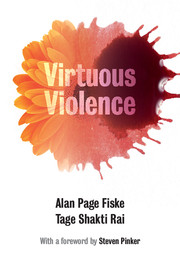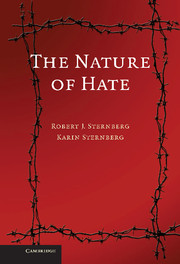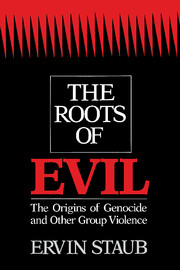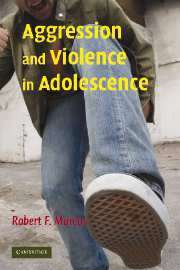Virtuous Violence
Hurting and Killing to Create, Sustain, End, and Honor Social Relationships
£19.99
- Authors:
- Alan Page Fiske, University of California, Los Angeles
- Tage Shakti Rai, Northwestern University, Illinois
- Date Published: November 2014
- availability: Available
- format: Paperback
- isbn: 9781107458918
£
19.99
Paperback
Other available formats:
Hardback, eBook
Looking for an inspection copy?
This title is not currently available on inspection
-
What motivates violence? How can good and compassionate people hurt and kill others or themselves? Why are people much more likely to kill or assault people they know well, rather than strangers? This provocative and radical book shows that people mostly commit violence because they genuinely feel that it is the morally right thing to do. In perpetrators' minds, violence may be the morally necessary and proper way to regulate social relationships according to cultural precepts, precedents, and prototypes. These moral motivations apply equally to the violence of the heroes of the Iliad, to parents smacking their child, and to many modern murders and everyday acts of violence. Virtuous Violence presents a wide-ranging exploration of violence across different cultures and historical eras, demonstrating how people feel obligated to violently create, sustain, end, and honor social relationships in order to make them right, according to morally motivated cultural ideals.
Read more- Argues that violence does not result from a breakdown of morality, but is morally motivated
- Contrasts with prevailing theories on violence which explain violence as resulting from a lack of self-control, failure to think morally, or radical rational calculation
- Explains the motives for violence to help readers understand why people feel that it is right to harm or kill others, or themselves
- Compares a great many different kinds of violence - both culturally condoned and criminal - across different cultures throughout history
Reviews & endorsements
'With its wealth of eye-opening ethnographic and historical comparisons and its contrarian but well-argued analyses, this book is a fascinating exploration of violence and a major contribution to our understanding of the human condition.' Steven Pinker
See more reviews'Through compelling analyses ranging from primeval forms of human sacrifice to contemporary torture, ancient wars to medieval jousts, contact sports to gang fights, violent revolutions to suicide terrorism and mass murder, Virtuous Violence lays bare the moral motives for murderous passions, as a sort of evolutionary impetus to manage the interpersonal and intergroup interactions upon which societies depend, often aided by gods, spirits and abstract causes to which no creature but man is subject.' Scott Atran, Directeur de Recherche, Anthropologie, CNRS/Ecole Normale Supérieure, Paris and author of In Gods We Trust and Talking to the Enemy
'A provocative tour through the (long) world history of violence. You won't think about violence and its many manifestations - or read a newspaper - the same way again.' Dov Cohen, University of Illinois
'It's so hard for us to think clearly about violence because acts of violence trigger such strong moral condemnation. Fiske and Rai strip the moralism out of our own minds and put it where it belongs - in the minds of the perpetrators, who usually think their acts are justified. This astonishing book offers a unified approach to understanding the most ghastly events, from street crime and honor killings through war crimes and genocide. This book is essential reading for anyone who wants to understand and ultimately reduce violence.' Jonathan Haidt, New York University Stern School of Business, and author of The Righteous Mind
'It's not possible to have a clear understanding of the past, present or future of war, terrorism and torture without knowing the basic message of Virtuous Violence.' Richard E. Nisbett, Distinguished University Professor, University of Michigan
'We have all watched movies where violent actions occur as part and consequence of social relations, and where the art of the movie consists of letting the audience share exactly the same emotions and motives that make that violence inevitable and feel right. At the same time, the mainstream social psychological arguments rarely pick up on these motives. This book provides a powerful argument in favor of scientifically considering these causes of violence. It is a scientifically important book, which touches on many issues we are concerned about as citizens, and will surely attract much attention and discussion as well as hopefully influencing future work in the social and behavioural sciences on this topic.' Thomas Schubert, University of Oslo
'The authors of this exciting book convincingly show that most individuals and groups engage in violence believing that what they do is right, moral and even obligatory. This well-written book shows the great challenge of preventing such righteous violence, and provides the knowledge base to engage with this challenge.' Ervin Staub, author of The Roots of Evil; The Psychology of Good and Evil and Overcoming Evil
'Virtuous Violence settles the question of whether violence is a rational act or an expressive gesture triggered by the emotions. Morally motivated violence, the authors explain, is based on emotional experience. But while emotions may be acted on impulsively, there is no reason why a moral stance cannot be arrived at logically and pursued with careful planning. This solution is much more intellectually satisfying than the binary division of one versus the other, and means that the message of the book may be reconciled with the work of diverse theorists.' David Mansley, Theoretical Criminology
Customer reviews
Not yet reviewed
Be the first to review
Review was not posted due to profanity
×Product details
- Date Published: November 2014
- format: Paperback
- isbn: 9781107458918
- length: 384 pages
- dimensions: 229 x 152 x 18 mm
- weight: 0.62kg
- contains: 10 b/w illus. 1 table
- availability: Available
Table of Contents
The point
1. Why are people violent?
2. Violence is morally motivated to regulate social relationships
3. Defense, punishment, and vengeance
4. The right and obligation of parents, police, kings, and gods to violently enforce their authority
5. Contests of violence: fighting for respect and solidarity
6. Honor and shame
7. War
8. Violence to obey, honor, and connect with the gods
9. On relational morality: what are its boundaries, what guides it, and how is it computed?
10. The prevailing wisdom
11. Intimate partner violence
12. Rape
13. Making them one with us: initiation, clitoridectomy, infibulation, circumcision, and castration
14. Torture
15. Homicide: he had it coming
16. Ethnic violence and genocide
17. Self-harm and suicide
18. Violent bereavement
19. Non-bodily violence: robbery
20. The specific form of violence for constituting each relational model
21. Why do people use violence to constitute their social relationships, rather than using some other medium?
22. Metarelational models that inhibit or provide alternatives to violence
23. How do we end violence?
24. Evolutionary, philosophical, legal, psychological, and research implications
The dénouement.
Sorry, this resource is locked
Please register or sign in to request access. If you are having problems accessing these resources please email [email protected]
Register Sign in» Proceed
You are now leaving the Cambridge University Press website. Your eBook purchase and download will be completed by our partner www.ebooks.com. Please see the permission section of the www.ebooks.com catalogue page for details of the print & copy limits on our eBooks.
Continue ×Are you sure you want to delete your account?
This cannot be undone.
Thank you for your feedback which will help us improve our service.
If you requested a response, we will make sure to get back to you shortly.
×








